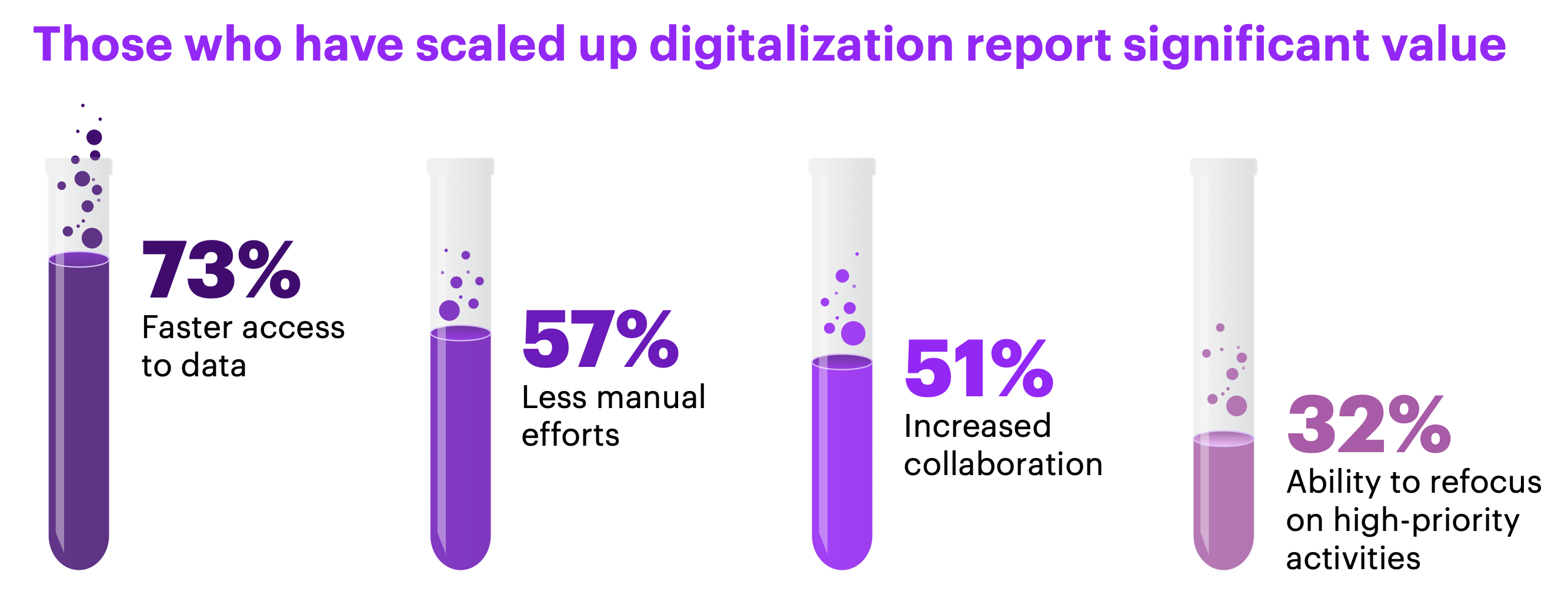Reflections on the Future of Digital in the Laboratory ( part II)

As part of the Paperless Lab Academy® 2022 Europe agenda, the panel discussion chaired by Mark Fish, Managing Director at Accenture’s Scientific Informatics Services Business, was a good exercise in thinking about the future of digitisation in the lab. For more information on the panellists from Accenture, SGS, Boehringer Ingelheim, Unilever and Dow Chemicals, see our part I article: Reflections on the future of digital in the laboratory.
The pandemic effect on the urgency of digital transformation
The fact is that the pandemic situation has influenced, is influencing and will influence the pace of digitisation. The life sciences industry’s response to the pandemic has demonstrated a new urgency and ability to deliver life-saving vaccines at unprecedented speed.
New expectations for speed, agility and digital capabilities in labs have emerged across all industries, and there is no turning back.
The panel discussion proposed several polls to the audience to understand how companies have responded to the pandemic.

Feedback from the audience said that the pace of digitisation has increased mainly because of the many concerns raised by the pandemic. Successful leaders recognised the need to accelerate and scale lab digital transformation by driving digitisation across operations and processes, integrating efforts across labs.
 Indeed, the overall laboratory informatics industry has seen an increase in sales, even if, surprisingly, the entire sales process has been handled remotely. In general, most projects were implemented appropriately, even though meetings such as kick-off, project review and training were again conducted remotely. On the one hand, the urgency was palpable, and the focus of the dedicated team was extreme.
Indeed, the overall laboratory informatics industry has seen an increase in sales, even if, surprisingly, the entire sales process has been handled remotely. In general, most projects were implemented appropriately, even though meetings such as kick-off, project review and training were again conducted remotely. On the one hand, the urgency was palpable, and the focus of the dedicated team was extreme.
Key drivers for the digital transformation of the lab
The panellists also wanted to know how the introduction of digital processes has improved productivity and collaboration and accelerated innovation. The following polls focused more on the difficulties of setting up a digital lab and the benefits that became apparent after the final implementation.
- What are the top 3 business drivers for your lab’s digital transformation?
- Where do you see the greatest benefit from digital lab processes?
- What are your 3 biggest obstacles to becoming a digital lab?
Interestingly, Accenture compared the results they published in their recent report. See full report and infographic: Faster innovation: Driving digitalization in the lab.
The survey summarises feedback from 118 industry leaders from scientific laboratories on how companies are using digitisation to improve treatment development processes.
The immediate measurable impact of the pandemic is the figures showing that in 2019, 40% of companies had not yet deployed digital solutions, while in 2021, 91% were taking actions towards digitalisation. In 2019, 37% launched new digital projects, while in 2021 69% are piloting or even scaling up the adoption of digital solutions.
© Copyright 2022 Accenture
Accenture’s report shows that those who have embraced digitisation see significant benefits in areas such as faster access to data, less manual effort, and better collaboration.

© Copyright 2022 Accenture
The use of digital technologies in science labs increases productivity and collaboration for faster innovation. However, the barriers to building digital labs are usually internal, such as a lack of skills and talent, resting on change, and lack of a clear strategic vision matured by top management.
It goes without saying that the greatest impact of the pandemic is on people. Along with the fact that digital labs can only be successful if the technology is fully integrated into people’s routines and perfectly accepted. The companies surveyed also insisted that people play a crucial role in accelerating digital transformation. Thus, key skills and talents were cited as the 3 most important factors for digital transformation. The lack of specialised skills, such as Data Science, was cited as one of the top 3 barriers. All labs report the need to further train existing teams in areas such as Data Science and computational modelling.
Successful leaders have therefore recognised the need to implement a talent strategy that attracts and retains staff with the right skills.
Latest Posts
Key Topics of the PLA2024India
PLA2024India, 5th edition, promises a programme full of interactions and discussions The main theme of #PLA2024India is Collaboration and Innovation f
14 May 2024
Press Release: PLA® Conferences to partner with IA-Meetings for its 5th Indian Edition.
The Paperless Lab Academy® (PLA) is a leading conference about digital transformation of laboratory and quality processes. Above all, it is about mas
08 April 2024
The #PLA2024Europe programme aimed to highlight the importance of the human factor in digital transformation with several presentations and panel disc
19 March 2024
